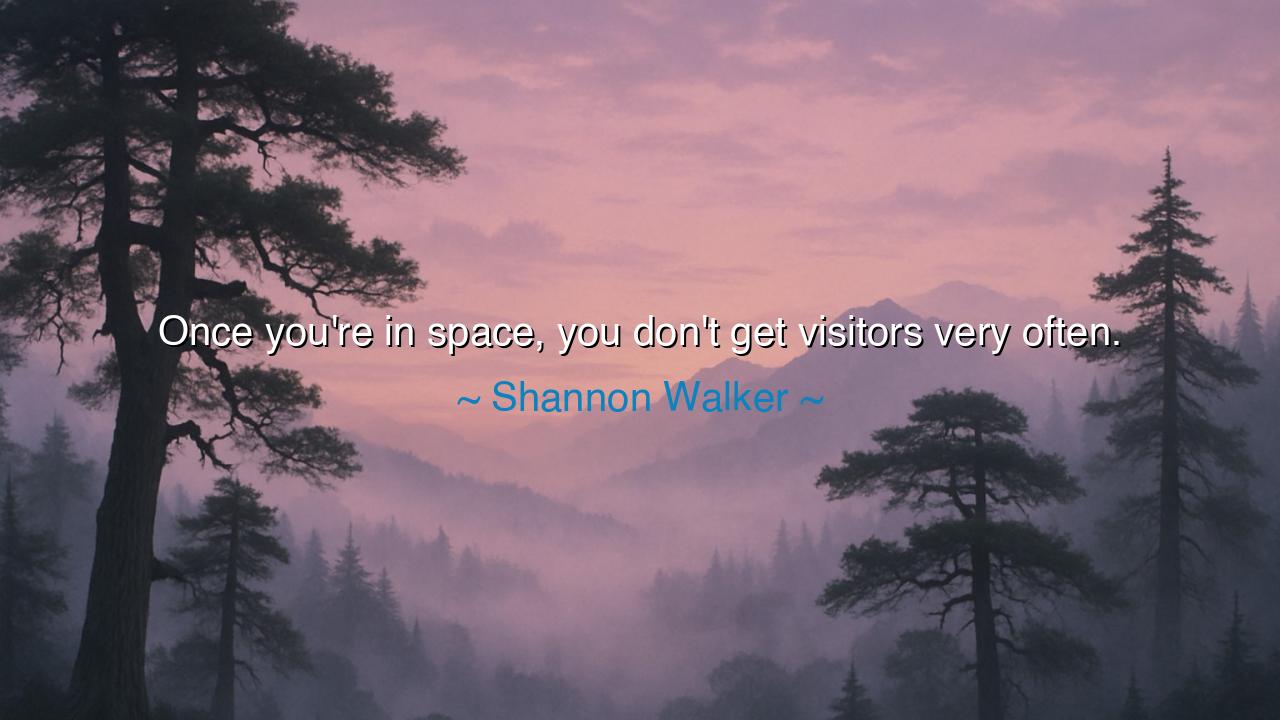
Once you're in space, you don't get visitors very often.






"Once you're in space, you don't get visitors very often." These words, spoken by Shannon Walker, resonate with a deeper truth about the journey of human existence. They speak to the loneliness that can accompany great achievement, to the solitude that often arises when one reaches for the stars—whether in the literal sense of exploring outer space or in the metaphorical sense of pursuing our greatest ambitions. Walker, a seasoned astronaut, speaks from the heights of human accomplishment, where the distance between oneself and the world grows wider and wider. Space, in this context, is not just a physical place, but a reflection of the distance we sometimes create between ourselves and others when we venture into the unknown.
In the ancient world, the great explorers and heroes of myth often faced journeys that mirrored this solitude. Consider Odysseus, whose long voyage to return home to Ithaca was not just a physical journey, but a spiritual one. Though surrounded by gods, monsters, and companions, Odysseus was ultimately alone in his quest. His struggle was not just to return to his physical home, but to find his place in a world that had changed while he was away. Space, in this sense, is like the long voyage of Odysseus—a journey that takes us far from the familiar and leaves us with few visitors along the way. As we reach for new heights, we often find ourselves isolated in ways we did not expect.
The notion that "you don't get visitors very often" reflects the harsh reality of great achievement: the further you travel from the norms of society, the less likely it is that others will follow. Think of the great pioneers of history—Christopher Columbus, Marco Polo, and the many explorers who ventured into unknown lands with little hope of being followed or understood. When Columbus set sail across the vast Atlantic, he was driven not by the comfort of companionship, but by the unknown that called to him. In that vast, uncharted ocean, he was alone with only his vision to guide him. The same can be said for astronauts, who, like Walker, venture into the endless void of space, a place where the human connection is far from immediate.
But while the absence of visitors in space may seem isolating, it also carries with it a profound sense of purpose. Just as Odysseus had to endure loneliness to fulfill his destiny, those who venture into the unknown must do so with the understanding that their journey is not about being surrounded by others, but about pursuing a calling that transcends the conventional. Space exploration, much like the quest of the ancient heroes, is an individual journey. Each astronaut, each explorer, must be prepared for the loneliness that comes with their commitment to pushing the boundaries of human knowledge. It is a sacrifice that few understand, but one that shapes the very course of history.
Take, for example, the story of Neil Armstrong, the first man to step onto the Moon. Armstrong’s famous words, "That’s one small step for [a] man, one giant leap for mankind," speak to the tremendous weight of his journey. Though he stood on the surface of another world, Armstrong was, in many ways, alone. His achievement, though shared with humanity, was a personal triumph of courage, resolve, and vision. The loneliness of space exploration, as Walker suggests, is not something to be feared, but embraced. It is through solitude that we find the space to reflect, to connect with our inner selves, and to make discoveries that would otherwise be impossible in the company of others.
But what, then, do we learn from this notion of solitude in pursuit of greatness? It teaches us that the journey to achieve our dreams often demands that we step away from the familiar, that we distance ourselves from the comfort of constant companionship. Greatness is born in the quiet, in the moments when we are not surrounded by the distractions of the world. Space, whether outer or inner, requires focus—a focus that can only be achieved in the silence of solitude. As Walker wisely notes, when we venture into the vastness of our own ambitions, we may find ourselves alone, but it is this solitude that allows us to make the bold choices that lead to discovery.
The lesson here is clear: to achieve something truly great, to reach for the stars, we must be prepared to embrace solitude. Whether you are an artist, a scientist, a writer, or a leader, the path to your highest potential will, at times, feel like a journey into space. There will be moments when you feel far removed from others, when you walk the road less traveled and find yourself without a map. Yet, it is in these moments of solitude that you will discover your true strength and purpose. Like the astronauts who venture into space, you too must find the courage to face the unknown, knowing that while visitors may be few, your journey will be one of immense personal significance.
As you move forward in your own life, remember that the absence of visitors is not a sign of failure, but a sign of progress. You are not alone because you are abandoned; you are alone because you have chosen to walk a path few dare to follow. So, rise to the challenge, embrace the solitude, and know that the greatest discoveries are often made when we venture into the unknown, guided only by our vision and the courage to face the vast emptiness with resolve.






AAdministratorAdministrator
Welcome, honored guests. Please leave a comment, we will respond soon